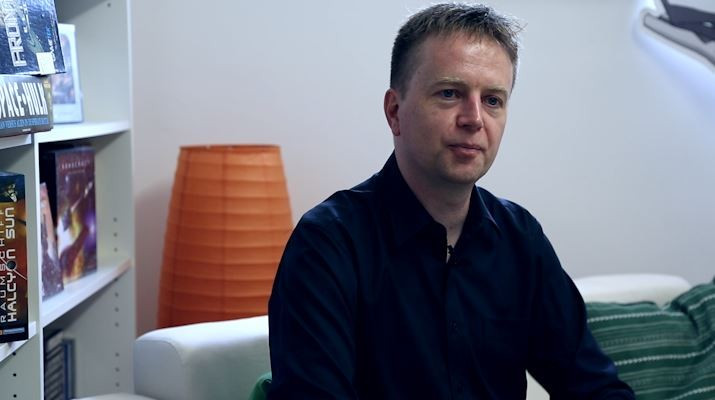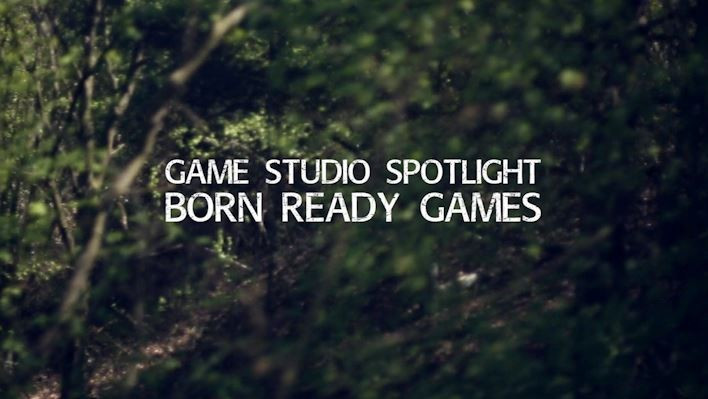Game Studio Spotlight - Born Ready Games

DOOM was made by four people; Elite was developed by two; Jeff Minter did Gridrunner by himself. In the good old pixelated days, videogames were created by small companies to serve a small audience. They were niche products, fetish properties - they thrived thanks to a modest but devout fanbase.
Game development today is much different. AAA studios employ teams numbering in the hundreds, and the audience for games has swelled to include everyone. Games are on your phone and your Facebook homepage. With so many people playing, it's down to huge teams to deliver games that will appeal to everyone.
There's so much money involved that serving the hardcore market - the PC market - is cost ineffective. Companies like EA aren't going to bother making games that reach 10% of gamers, not when they've the resources in place to reach, say, 50%. Genres that thrived in the Elite/DOOM/Gridrunner days have been phased out. That leaves independent companies, like Born Ready Games in Guildford, with a niche to cater to.
"All of this is related to the internet," explains Born Ready's CEO James Brooksby. "Like we're seeing with books, games don't actually need to exist physically, so, everything changes. I don't have to worry about only being able to send a lorry to such and such place, or only have a warehouse in one country - we've got a global distribution centre.
"Gamers are grouped together now on a global basis, so what you have now are global niches that can be served by companies such as us.
"We've decided that space games are our thing, but whereas a publisher might have said no, the appeal of those games is too small, now you can create a niche product and reach a global market with a niche interest. People into these niches tend to be hardcore gamers, Brooksby continues. "Gaming is their hobby, so they're quite willing to spend a reasonable amount of money on their hobby."
Space combat
Right now, Born Ready is focused on space combat games, which thrived in the nineties thanks to titles like Colony Wars but have since fallen by the wayside. Strike Suit Infinity, Born Ready's second game, launched in May and the company's now working on integrating the Oculus Rift headset with Strike Suit Zero, Infinity's predecessor. Aside from having the chance to reach large, generally forgotten niches, Brooksby says the benefit of working in small team is you get to create what you're interested in:
"The nice thing about what we're doing at Born Ready is that we're targeting a hardcore gamer in a niche which we ourselves enjoy, so by making a game we enjoy, the same people we're targeting will hopefully enjoy it as well. If you're working at a big company and making something for a middle-aged housewife, and you yourself aren't one, it's going to be a bit trickier.

"Strike Suit Zero came about from us having a conversation about what games weren't being represented. As fans of Tie Fighter, Wing Commander and Colony Wars we all said these were games that were great, but nobody's making them anymore.
"We had to bring some things up to date, but we were certainly building something for ourselves."
It's a change, Brooksby says, compared to the way studios function 10 years ago:
"There was a good long period in the late nineties to mid-2000s where it was mostly work-for-hire for publishers. You might have had an idea and pitched it to a publisher, and if you were lucky that would have turned into a project, but mostly it came in the other direction. There's much more freedom now thanks to open platforms."
Games vs industry
This is something we're seeing across the British industry. Suffocating tax rates have driven a lot of big companies either abroad or into bankruptcy, leaving dozens of developers jobless and eager to start their own companies. At the same time, platforms like Android, iOS and Steam have opened up, giving game makers an unrestrictive channel through which they can reach customers.
Games are at a point where small teams, or even just individuals, can make a bestseller, and thanks to years of financial squeezing in the UK, there are a lot of independent studios cropping up.
Such was the case with Hello Games and so it is now with Born Ready.
So, that's how the British game industry looks: Aside from stalwarts like Codemasters, tax incentives elsewhere have driven big companies either down or out, leaving behind small studios set up by refugees. That's the British industry, but how about British games?

Tiga, the industry body representing UK developers, wants to see more culturally British-looking games; Ralph Fulton, of Forza Horizon developer Playground, was less sure.
Brooksby's in between. The freedom is there now he says, but exactly what this mythical British game would look like, he doesn't know:
"From the very moment of conception of a game, you're thinking, 'right, I need to sell this - what's the biggest market I can reach and speak the same language as? North America. I'll Americanise my game.' That train of thought is like a millisecond long.
"But what we've talking about now, with digital distribution, smaller studios, better tax credit and less risk, is that there may be games that are more culturally British. However, I don't know what that means in real terms, since I don't have an idea of a British game that's very British.
"But there will be people that do, people who can realise now that they can get it out there without needing a big team. With more financial help, and things like Kickstarter which now has a UK branch, there are things out there giving help to an ostensibly more British product. At the moment, the British industry and British games are not necessarily the same thing but they could come back together."
Watch the full interview with James Brooksby here:

Previous Episodes:
Episode Three - Playground Games
Episode Two - Hello Games
Episode One - Codemasters
© Copyright IBTimes 2025. All rights reserved.






















